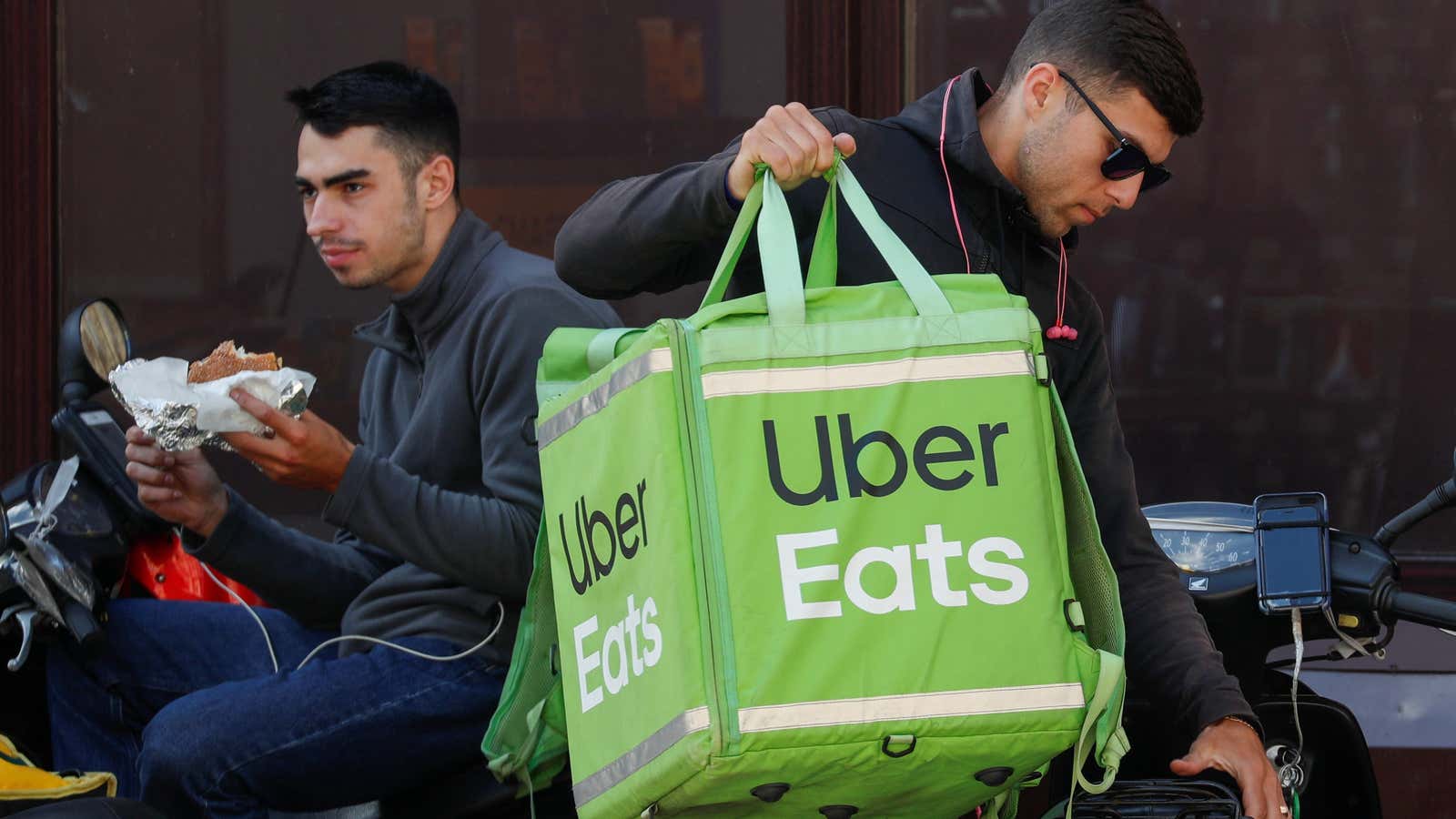As Covid-19 moves beyond the borders of China and across the world, the disease caused by a novel coronavirus is threatening to slow economic activity everywhere it turns up. News of its spread is raising hairs in corporate boardrooms and has encouraged some businesses to advise employees to work from home.
But if someone makes a living delivering food, chances are they won’t have that luxury. In fact, if the situation in China is a harbinger of what’s to come, app-based orders for food delivery outside China may also skyrocket.
That lays bare the biggest debate in the gig economy: Who is responsible for these workers? Uber, a gig economy poster child, has aggressively maintained that the workers who drive with its ride-hailing cab service and deliver food under its Uber Eats brand name are independent contractors, not employees with all the benefits that employees are entitled to by law.
So what happens if a courier gets coronavirus while delivering someone’s food? Who’s liable for the health coverage?
Not a lot of people have studied the intersection of the gig economy and public health crises, says Erin Hatton, an associate professor of sociology at the University of Buffalo whose expertise is in labor and political economy. “We really need to bring new eyes to this,” Hatton says. “This is why such workers can fall through the cracks, because no one is responsible for them.”
National laws governing whether gig economy workers are contractors or employees are a patchwork (pdf). And where legal bodies attempt to give them more rights, companies such as Uber and DoorDash have pushed back, hard.
They haven’t been particularly successful: In December 2018, Uber lost a court appeal in the UK that ruled its workers should be treated as employees. In September 2019, even the company’s fierce lobbying efforts couldn’t stop legislation in California that required the company to classify its workers as employees, each of them entitled to minimum wage protections and health care benefits. The following month, the Uber Eats delivery staff in Japan successfully formed a labor union.
But in many locations, gig economy workers remain benefit-less. In New York, for instance, Uber workers are entitled to minimum wage, but not to employee benefits and protections. That’s precisely the type of market in which the spread of the coronavirus, labor policy, and the gig economy may collide.
In China, anxiety about the spread of the virus slowed the economy as people were encouraged to stay home from work to avoid exposure. This led to an uptick in online food delivery orders, which dispatched couriers in cities across the country with grocery and meal orders. If the virus spreads elsewhere, it wouldn’t be unreasonable to anticipate similar situations unfolding.
So what happens when you throw the biggest debate about the gig economy into the eye of an unfolding and still-unpredictable global pandemic? At the most it may lead to litigation that would again force the debate into a courtroom. At the very least, it will force more conversation around the value of the work food deliverers do—even, perhaps, spark conversation about receiving higher pay for working through an outbreak.
Hatton said there doesn’t exist much precedent for food workers, but “I know that in hospitals there is some higher pay for less desirable shifts, and one could imagine that happening in this scenario as well,” she said. “Still, the most disadvantaged workers will be more likely to put themselves at risk.”
And as for the ethics of being a consumer during a pandemic—that’s a little less murky for Hatton.
“It’s a little unfair to the put onus on individuals, because any one person’s behavior is not going to change the system,” she says. “What we really need is structures in place, regulations in place to get the greatest good for the most people.”
